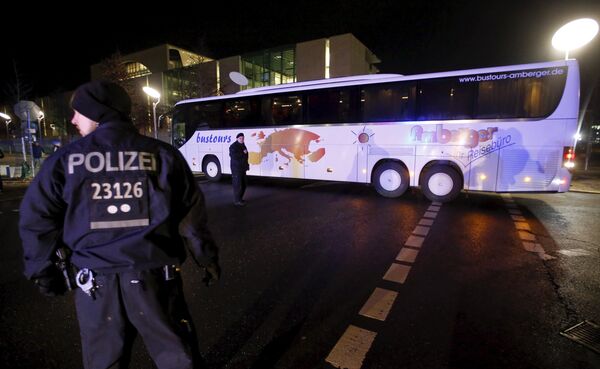Administrators in Germany’s federal states are struggling to keep up with the registration and deportation process because of decades of cuts to its civil service, which has left the system unable to cope with the influx of over a million refugees.
The record number of arrivals – five times that of 2014 – included 428,468 Syrians, 154,046 Afghans, followed by 121,662 Iraqis. The number included just under 3,000 Moroccans and Algerians. The sheer volume had created a huge administrative backlog, the ministry admitted, which has reached over 470,000.
How can the EU protect itself without betraying its values? https://t.co/LLMaGSm8iN #refugeecrisis #wef pic.twitter.com/Ww0q5WrMSe
— World Economic Forum (@wef) January 21, 2016
The ministry also admitted that the 1.1 million figure could include repeated registrations in different states, as well as those who have subsequently moved out of Germany and into other member states, chiefly Sweden. Germany will only accept genuine refugees fleeing war zones and will send back economic migrants who want to leave countries at peace to enjoy a better standard of living.
However, efforts to deport those who do not match refugee status have floundered because the administration is collapsing. According to Der Spiegel, embassies of Tunisia, Morocco and Algeria are showing little interest in processing deportations, leading to thousands of migrants remaining in Germany – not deported – with a system seemingly powerless to do anything about it.
Million Hours Police Overtime
In Bavaria – the southern state that has borne the brunt of the refugee crisis – District administrator Peter Dreier arranged for a group of refugees to be put on a bus and taken on a seven-hour journey from Bavaria to Chancellor Angela Merkel’s office in Berlin to highlight the issue.

He said that his district of Landshut had no more space for asylum seekers and that Merkel herself should take more control.
"I am always in favor of giving these people somewhere dignified to live, but not in temporary shelters or gymnasiums for months, or anything like that. We just can’t provide proper accommodation for so many people fast enough, which is why we have to make a statement."
Meanwhile, the German police trade union has warned that federal officers will not be able to maintain its southern borders indefinitely. Deputy head of the GdP union Jörg Radek told the Neue Osnabrücker Zeitung newspaper:
"We can manage it for about three weeks, but we don't have enough personnel strength to last longer […]. We've already piled up two million hours of overtime, that's the equivalent of 1,100 officers."
On Wednesday, German Interior Minister Thomas de Maizière said that the government would continue to the extend border controls past a February deadline. "I foresee no time when we'll be able to end [border controls]," de Maizière had told broadcaster MDR.



